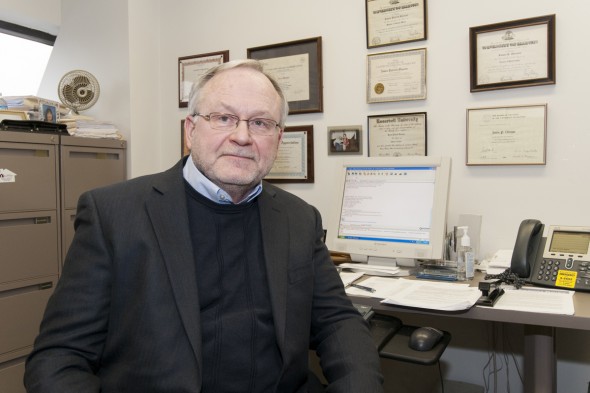Impact of kinship care on families, kids

James Gleeson, associate professor of social work, is an expert on kinship care, when relatives other than parents raise a child. Photo: Joshua Clark/UIC Photo Services
For grandparents who are caring for their grandkids, “it’s a double-edged sword,” said James Gleeson.
“Some will say it gives them a lot of meaning and purpose,” said Gleeson, associate professor in the Jane Addams College of Social Work.
“For others, it costs them so much — it’s exhausting.
“The interesting thing is that people can report a high level of stress and burden, while at the same time, a high level of satisfaction.”
Their feelings seem to be contradictory, he said.
“Some say, ‘I wouldn’t have it any other way — but it does get to me.’”
Gleeson is an expert on kinship care, in which any relatives other than the parents are raising children.
He sees aunts, uncles, cousins, even older brothers and sisters, caring for kids, but “two-thirds are grandparents in the studies we’ve done.”
Ages of the caregivers he’s familiar with range from 72 to 22 — a young woman raising her preteen brother.
“Their mother, in her 40s, has a serious drug addiction,” he said.
The young make up a small percentage of caregivers, fortunately for them — “often they’re trying to finish their education, establish themselves in a job,” Gleeson said.
At the other end of the scale, grandparents can experience a lot of stress, “only partly due to the fact you’re caring for a young child when you weren’t planning to,” he said.
The stress may express itself in high blood pressure and a host of other medical problems.
And particularly among low-income caregivers, “they will often forego their own medical care to make sure the kids are taken care of,” Gleeson said.
It can get complicated. For instance, he’s seen grandparents caring for the children of more than one of their own children.
The reasons parents can’t do their own parenting vary.
“It’s not always drug abuse,” Gleeson said. “In some cases, a parent died or became ill. Some parents have died in a car accident together.”
Over the past decade, the number of American children being raised in a home with neither parent present has grown six times faster than the number of kids in the general population.
Census figures put that number at 2.7 million. For kids in a household with one parent but headed by another relative, it’s more than 6 million.
“Families with the highest rates of poverty also have the highest rates of caring for a relative’s child,” Gleeson said.
The numbers are higher for Caucasian children, he said, “but African Americans are more likely to be raised by relatives than any other child.”
Substance abuse and young, inexperienced parents help drive the numbers up, “and I can’t imagine that the economy is not part of it,” Gleeson said.
“The growth has continued for decades,” he said. “Not only are more relatives caregivers, it’s more multigenerational.”
With a shortage of licensed foster homes beginning in the early 1980s, the child welfare system turned to relatives.
“And it’s a good thing that families are taking care of their own,” Gleeson said. “These kids tend to do better than kids in foster care, in terms of the traumas they are exposed to.”
Gleeson, who grew up in Kankakee, earned his bachelor’s degree from Benedictine University, then called St. Procopius College, in Lisle.
He received master’s degrees from Roosevelt University and UIC, then a Ph.D. from UIC.
He worked for 15 years in child welfare — nine with Maryville Academy and six with Central Baptist Children’s Home and Family Services (now known as One Hope United) — before starting at UIC in 1987.
Gleeson lives in Lake Villa with his wife, Linda, a fourth-grade teacher at St. Anastasia Catholic School in Waukegan.
They have two daughters: Tara, 30, a marketing associate for Chubb Insurance, and Kristen, 22, an accountant with Nokia.
In thinking about kinship care, Gleeson usually focuses on the viewpoint of grandparents and other caregivers.
But occasionally he considers what it’s like for those who are being cared for.
“Some kids just love living in a house with their cousins,” he said. “It may be hard on the adults, but the kids like it a lot.”
gwisby@uic.edu
